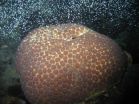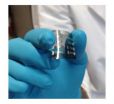(Press-News.org) FORT LAUDERDALE-DAVIE, Fla. – It seems that coral reefs are experiencing something their human counterparts have been for years – a shrinking "empty nest" syndrome.
That's right – researchers have found that increasing ocean temperatures due to climate change will soon see reefs retaining and nurturing more of their own coral larvae, leaving large reef systems less interconnected.
The study brought together an international group of researchers from NSU's Oceanographic Center; the Australian Research Council Centre of Excellence for Coral Reef Studies and the School of Marine and Tropical Biology at James Cook University in Australia; and Sesoko Station, Tropical Biosphere Research Center at the University of the Ryukyus, Japan.
"This research has potentially significant implications for understanding the future of coral reefs," said Richard Dodge, Ph.D., dean of NSU's Oceanographic Center. "It has benefited from the outstanding international collaborations the Oceanographic Center has with researchers at James Cook University (Australia) and the University of the Ryukyus in Japan."
These findings have both positive and negative implications.
"We found that at higher temperatures more coral larvae will tend to stay on their birth reef," says Joana Figueiredo, Ph.D., who is with NSU's Oceanographic Center but was with the ARC Centre of Excellence for Coral Reef Studies (Coral CoE) at James Cook University when the study began. "This is good news in an otherwise cloudy picture for isolated reefs, because in the future they will be able to retain more of their own larvae and recover faster from severe storms or bleaching events."
Figueiredo is the lead author of the study, entitled Increased Local Retention Of Reef Coral Larvae As A Result Of Ocean Warming, published today by Nature Climate Change.
Sean Connolly, Ph.D., also from the Centre of Excellence for Coral Reef Studies, explained that while more coral larvae will stay close to their parents, fewer will disperse longer distances, leaving reefs less connected.
"The loss of connectivity can make reef systems such as the Great Barrier Reef (in Australia) or the Florida Coral Reef Barrier more vulnerable," he said. "So interconnected reef systems that depend on the recruitment of coral larvae may take more time to recover after a disturbance, such as a hurricane, because fewer larvae will disperse from other reefs to the disturbed reef."
Connolly added that weaker connections between reefs means warm-adapted corals, such as those in the Caribbean, may take longer to expand their ranges to the north.
Similarly for isolated reefs, Saki Harii, Ph.D., from the University of the Ryukyus said: "While isolated reefs can retain more of their own larvae, this also leaves them with fewer possibilities to change their species composition to adjust to climate change."
Andrew Baird, Ph.D., from the Centre of Excellence for Coral Reef Studies said the implications of the research present management with both challenges and opportunities.
"Our results demonstrate that global warming will change patterns of larval connectivity among reefs," he said. "On a positive note, the stronger link between adults and recruits means an even greater benefit if we reduce local threats such as dredging and fishing methods that can damage corals," Dr Baird says.
Nevertheless, he said: "This does not reduce the need for global action on climate change."
INFORMATION:
The paper, Increased local retention of reef coral larvae as a result of ocean warming by Joana Figueiredo, Ph.D., Andrew H. Baird, Ph.D., Saki Harii Ph.D., and Sean R. Connolly, Ph.D., published today by Nature Climate Change and images are available on request.
CONTACTS
Joana Figueiredo, Ph.D., Nova Southeastern University (Oceanographic Center), +1-954 262 3638, jfigueiredo@nova.edu
Sean Connolly, Ph.D., James Cook University, +61-7 4781 4242, sean.connolly@jcu.edu.au
Andrew Baird, Ph.D., James Cook University, +61-7 4781 4857, andrew.baird@jcu.edu.au
Saki Harii, Ph.D., University of the Ryukyus, +81-980 47 6073, sharii@lab.u-ryukyu.ac.jp
Melissa Lyne, media liaison, +61-4 1551 4328, melissa.lyne@gmail.com
New research shows increasing ocean temperatures affecting coral reefs
More coral babies staying at home on future reefs
2014-04-29
ELSE PRESS RELEASES FROM THIS DATE:
Stress research in therapy dogs reveals animals' needs
2014-04-29
So-called animal-assisted therapy is being used increasingly often to treat physical and mental diseases in man. "For stressed persons, animals may serve as "social ice-breakers" and thus motivate them to enroll in therapy in the first place," says Lisa Maria Glenk, the lead author of the study. Scientific investigations on animal-assisted therapy do exist, but these have been largely confined to studying the effects of such therapy on man.
Lisa Maria Glenk conducts research at the Department of Comparative Medicine at Messerli Research Institute. She is a pioneer in ...
Drug monitoring information improves regimen adherence, Carnegie Mellon researchers say
2014-04-29
PITTSBURGH—Most people want to take mediations as prescribed, even if they sometimes need a little help remembering. For them, an automated system that monitors drug taking and provides feedback after the fact may be more useful than one that nags people when it is time to take a pill, researchers at Carnegie Mellon University say.
In a 10-month study of such a system in the homes of older adults with chronic health problems, the researchers found that adherence to a medication regimen improved when people had ready access to a digital display of their medication-taking ...
'Race, risk and behaviors: A type 2 diabetes update'
2014-04-29
Philadelphia, April 29, 2014 – Clinical Therapeutics features a special report in its April issue focusing primarily on the behavioral issues associated with patients' self-management of type 2 diabetes. "Diabetes, perhaps more so than any other chronic disease, requires people to significantly modify their behaviors—sometimes in ways that are contrary to their cultural norms and backgrounds—even when they don't 'feel' sick or experience symptoms of the disease," said John G. Ryan, Dr.PH., Topic Editor for Endocrinology and Diabetes, and guest editor for the April 2014 ...
Facial transplantation: Almost a decade out, surgeons prepare for burgeoning demand
2014-04-29
Plastic and reconstructive surgeons leading the first retrospective study of all known facial transplants worldwide conclude that the procedure is relatively safe, increasingly feasible, and a clear life-changer that can and should be offered to far more carefully selected patients.
Reporting in The Lancet online April 27, NYU Langone plastic and reconstructive surgeon and senior author Eduardo Rodriguez, MD, DDS, says results after nearly a decade of experience with what he calls the "Mount Everest" of medical-surgical treatments are "highly encouraging."
The review ...
Stroke risk reduced if brain blood vessel disorder is left alone
2014-04-29
Treating patients who suffer from a common condition that affects blood vessels in the brain increases their risk of stroke, a study has found.
People with a condition known as arteriovenous malformation (AVM) – which causes blood vessels in the brain to tangle – have a better outcome if doctors treat their symptoms only and not the AVM.
A team of doctors looked at the long-term outcome of patients with the condition, which is caused by abnormal connections between the arteries and veins in the brain.
They found that, over a 12 year period, patients who chose not ...
In a commanding position -- and now cheaper
2014-04-29
It is a requirement of the touchscreens for all our everyday gadgets that they are transparent and at the same time electrically conductive. Solar cells are also unable to operate without such a film, which allows sunlight to pass through it, but can also conduct the current generated. Conventional "transparent conductive oxide" (TCO) films consist of a mixture of indium and tin oxide. Indium in very much in demand in the electronics industry, but is rare, and therefore expensive.
A cheaper option (at least in terms of the materials used) employs zinc oxide mixed with ...
Study highlights importance of parents talking to kids about money
2014-04-29
A new study from North Carolina State University and the University of Texas finds that children pay close attention to issues related to money, and that parents should make an effort to talk with their children to ensure that kids don't develop misconceptions about finance.
"We wanted to know what kids are learning, or not learning, about money from their parents," says Dr. Lynsey Romo, an assistant professor of communication at NC State and lead author of a paper on the research. "This is one of the first studies to look at what young school-age children know about ...
Man landing on Madeira could be 4 centuries prior to its colonization by the Portuguese
2014-04-29
VIDEO:
Four centuries before its colonization by the Portuguese, man may have landed on Madeira Island. This can be deduced from a study led by the Spanish National Research Council (CSIC),...
Click here for more information.
According to the results, published in the Proceedings of the Royal Society B journal, house mice may have landed on the island before 1036, most likely transported by a ship. The article suggests that the introduction of this species would result in an ...
Immunology touted as next big thing for popular science
2014-04-29
A University of Manchester professor says scientific jargon could be making the science of the human immune system a turn-off for the general public.
Professor Daniel Davis says that scientists are using a number of innovative ways to generate public discussion on immunology and the time is right for people to get to grips with the subject.
His paper, published today in Nature Reviews Immunology, coincides with the International Day of Immunology, argues that now is the right time for immunology to become the next big trend in popular science – to inform new discussions ...
Nutrition experts chew the fat at ASN satellite symposium
2014-04-29
(San Diego, CA) April 25, 2014 – More research is needed to better understand the important role that dietary fats play in optimal health, said a panel of leading food and nutrition scientists Friday at an American Society for Nutrition (ASN) pre-annual meeting session.
More than 130 academic and industry food and nutrition scientists and registered dietitians attended the half-day ASN Satellite Symposium: Let's Chew the Fat: Current Thinking on Dietary Fats and the Food We Eat, held from 1-5 pm at the San Diego Bayfront Hilton in conjunction with the ASN's 78th Scientific ...
LAST 30 PRESS RELEASES:
Scientists show how to predict world’s deadly scorpion hotspots
ASU researchers to lead AAAS panel on water insecurity in the United States
ASU professor Anne Stone to present at AAAS Conference in Phoenix on ancient origins of modern disease
Proposals for exploring viruses and skin as the next experimental quantum frontiers share US$30,000 science award
ASU researchers showcase scalable tech solutions for older adults living alone with cognitive decline at AAAS 2026
Scientists identify smooth regional trends in fruit fly survival strategies
Antipathy toward snakes? Your parents likely talked you into that at an early age
Sylvester Cancer Tip Sheet for Feb. 2026
Online exposure to medical misinformation concentrated among older adults
Telehealth improves access to genetic services for adult survivors of childhood cancers
Outdated mortality benchmarks risk missing early signs of famine and delay recognizing mass starvation
Newly discovered bacterium converts carbon dioxide into chemicals using electricity
Flipping and reversing mini-proteins could improve disease treatment
Scientists reveal major hidden source of atmospheric nitrogen pollution in fragile lake basin
Biochar emerges as a powerful tool for soil carbon neutrality and climate mitigation
Tiny cell messengers show big promise for safer protein and gene delivery
AMS releases statement regarding the decision to rescind EPA’s 2009 Endangerment Finding
Parents’ alcohol and drug use influences their children’s consumption, research shows
Modular assembly of chiral nitrogen-bridged rings achieved by palladium-catalyzed diastereoselective and enantioselective cascade cyclization reactions
Promoting civic engagement
AMS Science Preview: Hurricane slowdown, school snow days
Deforestation in the Amazon raises the surface temperature by 3 °C during the dry season
Model more accurately maps the impact of frost on corn crops
How did humans develop sharp vision? Lab-grown retinas show likely answer
Sour grapes? Taste, experience of sour foods depends on individual consumer
At AAAS, professor Krystal Tsosie argues the future of science must be Indigenous-led
From the lab to the living room: Decoding Parkinson’s patients movements in the real world
Research advances in porous materials, as highlighted in the 2025 Nobel Prize in Chemistry
Sally C. Morton, executive vice president of ASU Knowledge Enterprise, presents a bold and practical framework for moving research from discovery to real-world impact
Biochemical parameters in patients with diabetic nephropathy versus individuals with diabetes alone, non-diabetic nephropathy, and healthy controls
[Press-News.org] New research shows increasing ocean temperatures affecting coral reefsMore coral babies staying at home on future reefs




